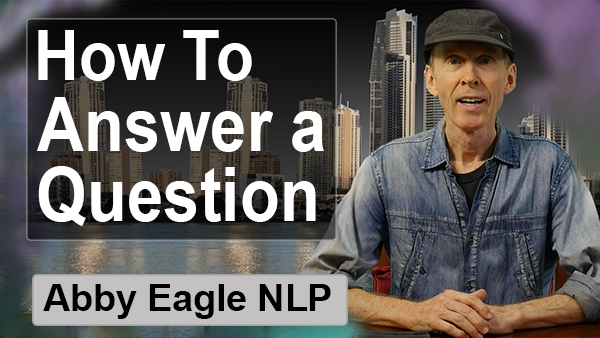
Learn to improve your debating and conversational skills by focussing on the different types of questions and how to answer the different types of questions. Use the contact form in the right side bar to book a free 20 minute Skype or Zoom session.
Critical Thinking & Debating Skills - How to Answer a Question
By Abby Eagle (2023)
Click the Image to Watch on YouTube
In this article I am going to show you a number of ways for you to answer a question.
Step 1 – take note of who is asking the question. That sets a frame, a context and a possible agenda for the questioner.
Step 2 – pause and give yourself time to analyse the type question.
1. Is it a direct question in which you are expected to answer with a ‘yes’ or a ‘no’?
2. Is it a leading question where the questioner is trying to lead you towards a preconceived outcome?
3. Is it an open ended question in which you have much more freedom to answer the question?
4. Or is it a meaning type question in which the questioner is trying to gain an understanding of the way that you think and behave?
No matter the type of question the questioner has an intent to gather information. The question that you need to keep in mind is – is this questioning procedure in my best interest or could I end up compromising myself?
Keep in mind the sales person’s adage which is, answer a question with a question. For example a customer is looking at cars in a car yard and he says to the salesperson, “Do you have a blue BMW?” This is a direct question but the sales person does not answer ‘yes’ or ‘no’ because he knows that if he does then the customer could say, “thanks for the information, I will think about that”, and walk away. So the sales person replies, “Do you want to buy a blue BMW?” Or he might soften it and say, “Are you interested in buying a blue BMW?” The sales person is looking for a ‘yes’ – which is a conditional close and then he can move the customer onto the next step in the sales process.
So there are a number of ways to reply to a question.
1. Intention
One way to reply to a question is to ask, “Why do you ask?” You want to get an idea if the questioner has an agenda – what do you think they might be trying to achieve by asking you that question?
2. Pace and Deflect
Depending upon the type of question and whether it is directed at you personally or not you may want to deflect the question away from yourself and say, “That is an interesting question – I have been asking myself the very same question – or a lot of people have asked that type of question. Just wondering what it will mean when you get an answer to that question?”
So you shift yourself away from being the target of the question – which is sort of like being on the defence – and then you step into the commanding position and go on the offence.
3. Repeat the Question and Ask Another Question
Let’s say someone asks you if you believe in man made climate change. So you repeat the question – “Do I believe in man made climate change?” and then ask, “Is that the most appropriate question?” What do you hope to learn by asking that question? You could also say, “Would ‘x, y, z’ be a more appropriate question?”
4. Gain Clarification / Paraphrase
There may be a situation where you sense that the questioner is attempting to gather information which they could use against you - or you may be unsure of where they are coming from and you need more clarification of the context – so in this case you may paraphrase their question by restating it using different words.
This is the pattern where the interviewer says, “are you saying that x, y and z?”
Your intention could be to sincerely narrow in on the topic or it could be because you don’t want to answer the question directly because it could compromise you so you keep paraphrasing the question and restating it to shift to a different topic.
5. Make a Statement
When someone asks you a question – rather than answering the question – just make a statement about the topic that is referred to in the question. Politicians, especially Canadian politicians do this all the time. Someone asks a question of the politician and they reply with something that sounds like a policy statement on their website.
6. Shift the Focus?
Let’s say someone asks you a direct question like, “Do you support president so and so in the current war?” Rather than replying with a ‘yes’ or a ‘no’ which puts you into a box, you reply, “I think it’s too early to make a decision. What I think we should be doing is studying history to learn more about what has been going on in this region for the last 200 years. Another thing we could do is look to see if this pattern has occurred before.
If you are looking for an NLP Coach then feel free to send me an email and organise a free 20 minute Skype or Zoom session – and if you have not done so then please comment below, and join us over at the Facebook NLP & Hypnotherapy Group.
Share With Friends
| DISCUSSION GROUPS | |
|---|---|
 |
|
| NLP Future Selfing | |
| NLP, Hypnotherapy & Meditation | |
| NLP Peace Mapping | |
| Facebook Discussion Group | |










